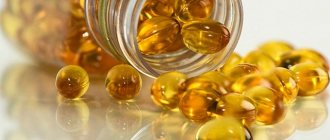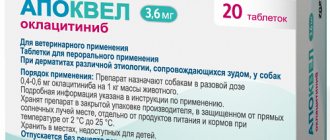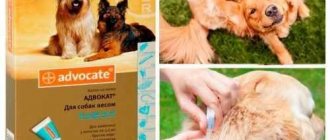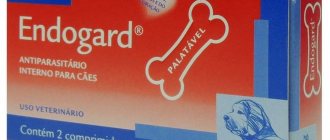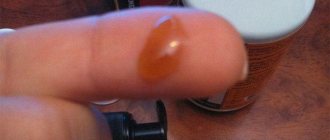For normal development, the body requires a certain set of microelements. Pets that eat natural foods often suffer from deficiencies of certain substances. For this reason, their diet should be enriched with special supplements.
Fish oil, available in capsules and liquid form, is familiar to many, but only a few know how to give it to a dog. But the wrong dosage can negate all its benefits and even harm your pet.
Can I give it to a dog?
Fish oil can be given to dogs when they are eating natural foods and not receiving vitamin supplements.
Combination with similar sources of biologically active substances is unacceptable, since in case of overdose, vitamins turn into toxic substances.
This article was written by a veterinarian, but cannot replace you with a consultation about your dog, because... We don’t know the specifics of your pet’s life and health. Therefore, if problems or side effects occur, be sure to contact a certified clinic.
Release forms
In capsules
Supplements for dogs are available in capsules and liquid form. The substance in capsules has a neutral odor, and in liquid form its cost is much cheaper. But the quality of both products is no different in their composition .
Liquid
Most people prefer the liquid preparation because it is easier to mix into food. And some animals are allergic to the gelatin capsule. It is easier to give puppies a liquid drink, but adults can be given a veterinary remedy in capsules. Most adult animals are happy to bite into the capsule themselves, and they like the pungent smell of the drug.
Important: please note that the medication does not contain any flavors or fragrances.
Beneficial properties of fish oil
Fish accumulate fats, which accumulate vitamins A; D; E. Biological catalysts are part of enzymes and hormones. Fish is a cold-blooded animal, so most of its fats have a low melting point. Polyunsaturated fatty acids have these properties - which, based on the location of the terminal double bond, are divided into omega 3 and 6.
The table shows the ratio of essential fatty acids in different oils:
Vitamin A (retinol) regulates the growth and development of the animal, ensures healthy skin, beautiful coat, and visual acuity.
Vitamin D (cholecalciferol) is necessary for the formation of the skeleton; its deficiency leads to rickets, which is characterized by tooth loss and bone curvature.
Vitamin E (tocopherol) binds free radicals, converts toxic peroxides into safe substances, increases fertility and the development of offspring.
The combination of vitamins cleanses the blood of bad cholesterol, prevents the formation of plaques on the walls of blood vessels, and normalizes the functioning of the nervous system. Fat is obtained by processing caught sea fish. Before going on sale, the original product is fortified and stabilized with antioxidants. Sometimes fish oil becomes the only remedy to prevent metabolic diseases.
About the benefits of fish, is it necessary in the diet?
River and sea fish are one of the sources of protein, in addition to meat, poultry, and eggs. It has a very high nutritional value, it contains essential amino acids and unsaturated fatty acids, microelements (iodine, iron, cobalt, zinc, lithium, copper, etc.), vitamins, and natural chondroprotectors.
Cod and salmon contain antioxidants. The composition and ratio of proteins and fats in fish meat depends on the time of year, habitat, lifestyle, species, gender and age, and physiological state. The amount of water and fat fluctuates around 80%.
| Nutrient | Classification | Percent, % | Examples |
| protein | low protein | > 10 | coal |
| medium protein | 10 — 15 | notothenia | |
| protein | 15 — 20 | herring | |
| high protein | < 20 | mackerel | |
| fat | lean | > 2 — 3 | hake (1.4), pollock (> 2), haddock (0.5), cod, pollock |
| moderately fatty | 3 — 8 | horse mackerel, sea bass, tuna, carp, bream | |
| fatty | 8 – 15 | sardine, mackerel, salmon, sturgeon | |
| especially fatty | > 15 | halibut, eel, whitefish |
This is not a product of first importance. Two fish days a week - and your pet’s joints, coat, and skin will significantly improve.
Indications for use for dogs
Fish oil for dogs: the role of Omega 3 in the dog’s body
The nutritional supplement is used to enrich the feed mixture from natural products in the following cases:
- intensive growth;
- poor appetite;
- pregnancy and lactation;
- skin diseases;
- weakened vision;
- shedding, fragility and dullness of the coat;
- prevention of metabolic diseases;
- accelerating recovery after injuries or operations.
Fish oil is used when dogs are not receiving other vitamin supplements.
How to choose a veterinarian?
On pharmacy shelves there is a huge variety of fish oil from different manufacturers. When choosing this medication, you should pay attention to the type of packaging, date, proper storage, and the absence of harmful flavors and additives in the composition.
It is necessary to buy the drug in veterinary pharmacies. Then the label will indicate that it is intended specifically for animals. The product you purchase must be highly purified.
Important: fish oil should not be stored in light or heat.
In what form to give fish oil for dogs: selection criteria
Fish oil is produced liquid or in gelatin shells. Bottles or vials are less expensive than capsules. Each dosage form has its own pros and cons.
Liquid form or capsules
You should not buy canisters or liter bottles of feed additive for the following reasons:
- Fish oil quickly deteriorates if not stored correctly. There is no guarantee that during transportation and being with the seller, the goods were not overheated or stored in the light.
- The expiration date label on the bottle is easy to replace. Expired fish oil contains peroxides that destroy vitamins.
- After opening the container, air enters , so the contents must be used up within 2-3 weeks.
It is important to know! There have been no clinical trials of fish oil in dogs.
The instructions for use of the dietary supplement indicate that the daily dosage for dogs ranges from 5 to 30 ml per day. Therefore, you should purchase a 100-gram bottle that costs 46 rubles.
Vitamins are absorbed in the small intestine. A significant part of them is destroyed by the aggressive environment of the stomach.
Therefore, dog experts recommend using a capsule supplement. Veterinary pharmacies sell it for 94 rubles. per pack 100 capsules.
Analogs from veterinary pharmacy
Pharmacy analogues of fish oil - Trivitamin, Vittri, Tetravit - are not in demand. They do not contain water-soluble vitamins, microelements, chondroprotectors, prebiotics, and therefore do not satisfy the needs of animals for biological catalysts.
Pet stores and veterinary pharmacies offer a wide selection of multivitamin preparations. Conscientious breeders inform the buyer what vitamin supplements they use. But it is best to consult a veterinarian.
Potential danger
Feeding your pet fish should not be done uncontrolled. A product of poor quality, containing a certain amount of harmful compounds, can do nothing but harm.
You can give your dog fish only after all factors that could be detrimental to its health have been minimized:
- helminthiases;
- presence of toxic compounds;
- content of special enzymes;
- violation of freshness;
- poisonous fish.
Helminthiasis
When feeding raw fish, there is a high risk of infecting your dog with helminths. Marine fish can be infected with a special type of helminthiasis. This is anisakidosis. The larvae of the pathogen are localized in all internal organs - muscles, liver and intestines. The disease often affects Pacific fish - mackerel, horse mackerel, saury, hake. It is processed as follows:
- freezing at -18ºC for 14 days or at -20ºC for 24 hours, followed by storage at -18ºC;
- heat treatment (it is best to give it boiled, cooking time - 25 minutes);
- sterilization in the manufacture of canned food according to GOST rules.
Presence of toxic compounds
When catching fish in unfamiliar bodies of water, you may encounter the fact that it will contain chemical elements that are dangerous to the body of dogs and humans. This mainly concerns lead and mercury. In addition, poor ecology causes the accumulation of toxic compounds: dioxins and polychlorinated biphenyls. The likelihood of containing such compounds in fish increases in direct proportion to its age. At risk are herring, mackerel, halibut, and eel. The accumulation of toxic substances often occurs due to feeding with low-quality feed during industrial fish farming.
Content of special enzymes
Feeding certain types of fish to pets is prohibited because they contain enzymes that can harm the health of animals. First of all, we are talking about thiaminase, trimethylamine oxide and histamine.
Thiaminase
Thiaminase is an enzyme found in some living organisms. Thiaminase is a catalyst for many biochemical processes. The best known action of this enzyme when ingested is to block and destroy thiamine (vitamin B1) molecules. Thiamine is necessary for the body to maintain the functioning of the nervous system. Vitamin deficiency is dangerous for the development of neuropathies, cardiovascular disorders, and manifests itself in other neurological symptoms.
Herring, capelin, crucian carp, smelt, anchovy, sardine, carp and others contain large amounts of thiaminase.
In order to destroy thiaminase, it is necessary to give your pet heat-treated (boiled) fish.
Trimethylamine oxide
Another organic substance that is undesirable for a dog to enter is trimethylamine oxide. It leads to iron deficiency anemia. It is synthesized in the body of cod, as well as in haddock, blue whiting, capelin, pollock and some others. When feeding these species, it is necessary to compensate for the resulting microelement deficiency by adding iron supplements. You can also protect the animal by heat treatment of the product.
Histamine
If some types of fish are not stored properly, toxins such as histamine can be produced. This is how a dog can get scombroid or mackerel poisoning. The disease gets its name from the mackerel family, since it most often develops when eating tuna and mackerel. Less commonly, exotic varieties can cause poisoning: (swordfish, mahi-mahi). You can protect your dog from illness by following the rules for processing and storing the product.
Violation of freshness of fish products
It is very important to ensure that your pet does not get spoiled food. During long-term storage, fish oil, which is contained in large quantities in the product, oxidizes, causing damage to bacteria and pathogens. You need to know what fresh fish should look like and be able to choose it.
The main characteristics of freshly caught fish are:
- pink gills covered with a small amount of mucus;
- bulging clear eyes;
- elastic muscle tissue;
- no unpleasant odor.
The quality of frozen carcasses is determined by the cut. The cut bone should be white or slightly yellowish, not brown.
Poisonous fish
Some fish species become poisonous at a certain period in their life. These include fish of the carp family, which become poisonous during the spawning period. The poison is contained in the eggs, and sometimes in the tissues surrounding them during the ripening period.
In addition, sea bass has poisonous spines on its fins. You need to be as careful as possible with such fish, and it is better not to eat them at all.
Features of calculating Omega dosage for dogs
How much fish oil should I give my dog?
Dosage calculation Fish oil is not a drug, but a feed additive!
To calculate the dosage of fish oil, they do not use the results of clinical trials, but calculations of the vitamin needs for pets of different ages, weights, and physiological conditions.
Dosage for puppies
Fish is fatty for suckling puppies. They get the necessary vitamins from milk. Unspent catalysts accumulate in a depot - subcutaneous tissue or liver. Cubs up to 3 months are provided with vitamin reserves supplied with milk.
But veterinarians and dog handlers recommend giving the feed additive immediately after weaning, so as not to use up reserves. The instructions recommend feeding the liquid supplement to dogs in an amount of 5 to 30 ml per day. Probably for two or three month old medium breed puppies the dosage would be 5 ml. A maximum of 30 ml should be fed to animals weighing 50 kg or more.
Manufacturers recommend giving dogs of small, medium, large breeds 2; 4; 9 capsules per day. That is, pets up to 10 kg are given 2 capsules, animals from 10 to 25 kg 4 capsules. It is better to split the dose into 2-4 doses, but it is not forbidden to give it once.
There is no consensus on the duration of a course of taking fish oil. Some dog breeders give puppies a food additive daily, others - in courses of 3 weeks with an interval of 7 days, and others - every 3 days.
For adult pets
The needs of dogs older than one year for biological catalysts decrease. Therefore, dog experts recommend that owners vitaminize dogs 2 to 3 times a year in 3-week courses of 5 to 30 ml per day.
Pregnant and lactating animals
A dog is considered pregnant one month after mating if signs of pregnancy appear. The dose of food and, therefore, fish oil should be increased by 50%. A lactating female consumes 3 times more food than a single female.
Accordingly, the portion of the vitamin supplement should be increased by the same amount, but not exceed 30 ml, since the limit is set by the instructions. After weaning, the bitch’s body condition is assessed and the supplement is extended for 2-4 weeks.
We recommend reading:
- TOP 8 Best flea and tick drops for dogs
- Holistic food for dogs: what is it, list of the best foods
- Is it possible to feed dogs cottage cheese - expert opinion
Shelf life and storage conditions
The liquid form should be stored only in dark glass bottles in a dark place and at a temperature no higher than 10 degrees. The drug is stored in a closed bottle for about a year, but after opening it can be used for no more than a month.
Capsules are less demanding. They can be stored at room temperature (but not higher than 25 degrees) in a dry and dark place. Shelf life – 2 years.
Capsules can be stored for two years
